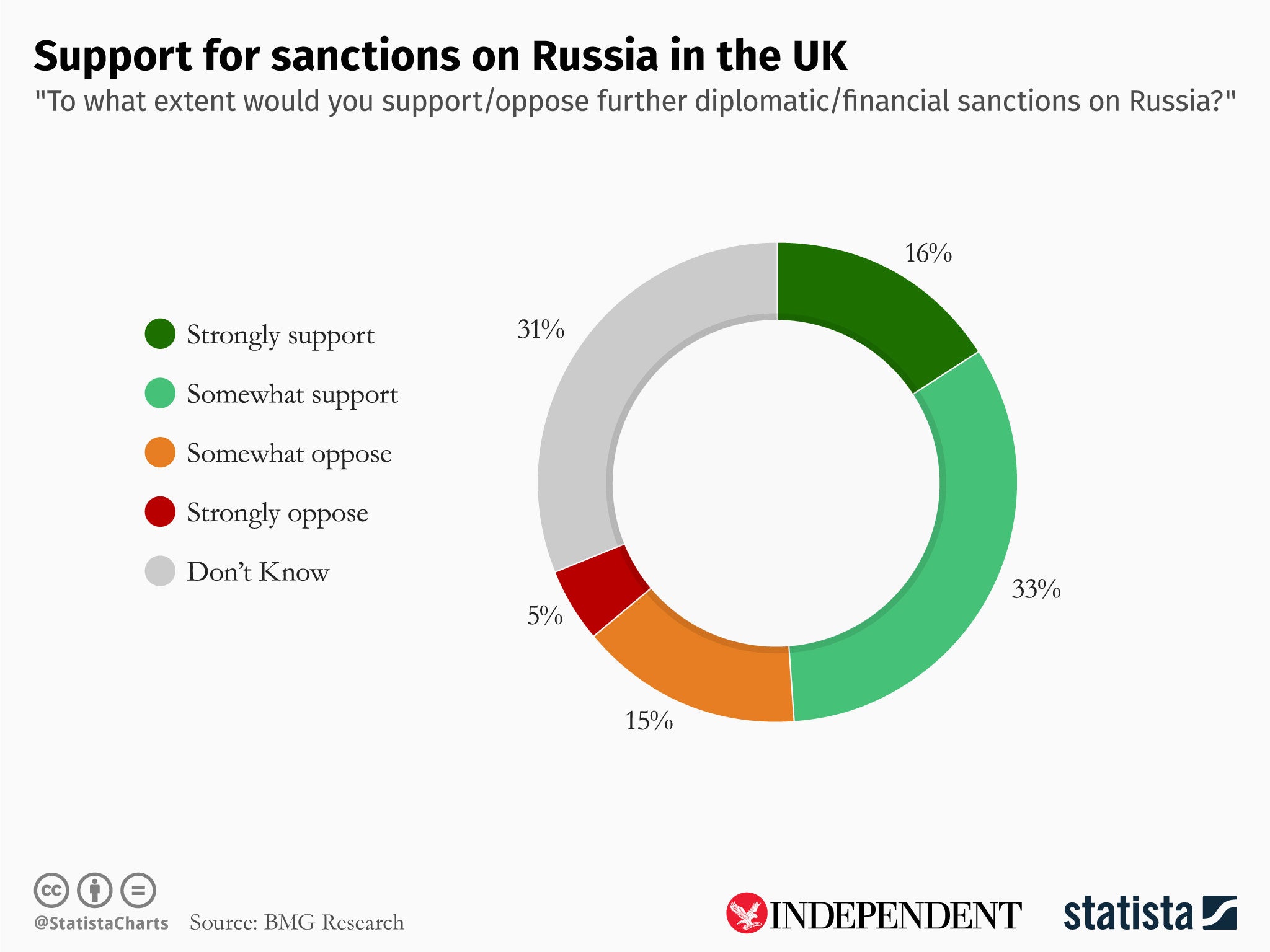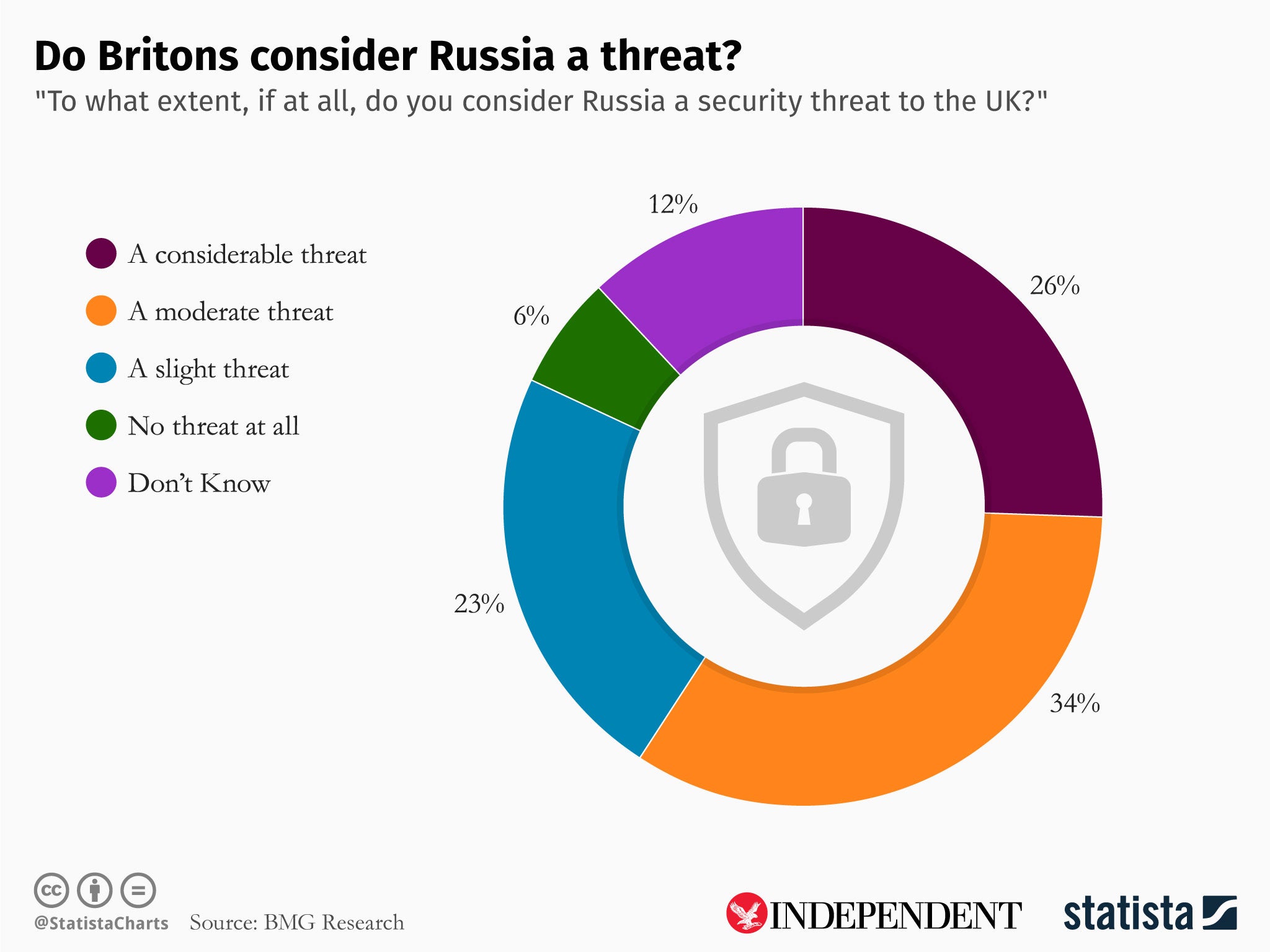Half of Britons want UK to increase Russia sanctions to combat threat, poll shows
Exclusive: Almost two-thirds of Brits see Russia as a threat to UK following Salisbury attack

Your support helps us to tell the story
From reproductive rights to climate change to Big Tech, The Independent is on the ground when the story is developing. Whether it's investigating the financials of Elon Musk's pro-Trump PAC or producing our latest documentary, 'The A Word', which shines a light on the American women fighting for reproductive rights, we know how important it is to parse out the facts from the messaging.
At such a critical moment in US history, we need reporters on the ground. Your donation allows us to keep sending journalists to speak to both sides of the story.
The Independent is trusted by Americans across the entire political spectrum. And unlike many other quality news outlets, we choose not to lock Americans out of our reporting and analysis with paywalls. We believe quality journalism should be available to everyone, paid for by those who can afford it.
Your support makes all the difference.Half of Britons want the government to impose further sanctions on Russia to combat the threat from Moscow, a poll has revealed.
Nine months after the attempted assassination of Sergei Skripal in Salisbury – and amid growing fears of cyberwarfare – exclusive polling by BMG shows that 60 per cent of adults believe Russia poses a considerable or moderate threat to the UK.
And 49 per cent of the British public support the introduction of new diplomatic or financial measures against the Kremlin.
Sanctions and diplomatic expulsions levelled at Russia appear to have done little to deter its activities either internationally or on UK soil, where GRU intelligence agents are accused of causing a woman’s death and poisoning four other victims with novichok.
Britain and allies expelled dozens of Russian diplomats over the attack, while the UK is introducing legal powers to stop, search and detain people suspected of “hostile state activity” at its borders.
New unexplained wealth orders, which force subjects from outside the European Economic Area to reveal the source of their cash, are also expected to hit Russian oligarchs and organised criminals.
Russians have also been the biggest beneficiaries of “tier 1” investor visas, which allow anyone investing at least £2m to work in Britain and expedites leave to remain applications.
The government had admitted the “golden visa” scheme had been exploited for money laundering and serious organised crime and announced its suspension earlier this month.
However, without explanation, the programme has since been allowed to continue, although the Home Office insisted it was committed to “reforming the route”.

Critics have accused the current government and its predecessors of putting commercial interests above national security with an alleged reluctance to hit flows of Russian cash and trade.
Polling for The Independent showed that 60 per cent of people believe Russia is a threat to the UK, but 28 per cent thought it was only a “slight threat” or none at all.
Older people were more likely to see Russia as a threat, as were Conservative and Scottish National Party voters.
Asked their opinion on further diplomatic and financial sanctions on Russia, 16 per cent said they would strongly support the move and 33 per cent somewhat supported, while 15 per cent were somewhat oppose and 5 per cent strongly opposed.
Older people and Conservative voters were again more likely to back new sanctions, while Green and Ukip supporters were the most sceptical.
Meanwhile, almost one in four said they would support British military action against Russia, though half of the British public opposed the prospect of war.
Tensions between the UK and Russia have been mounting since the start of the Ukrainian war, and flared again with a confrontation in the Sea of Azov in November.
The foreign secretary condemned the incident further evidence of Russia’s “disregard for the global rules-based international system”.

“Russia must not be allowed to further erode Ukraine’s sovereignty and territorial integrity, especially through the use of force,” Jeremy Hunt added.
It came after the government named the GRU as the perpetrator of global cyberattacks, including one that saw the personal data of almost 700,000 UK nationals stolen.
The attacks were committed by several front groups, including one called Cyber Caliphate that presented itself as Isis-linked.
In October, the National Cyber Security Centre warned that Britain could be hit by a “category 1” cyber emergency in the near future – causing sustained disruption of essential services, affecting national security, causing severe economic consequences, or loss of life.
A report by the Chatham House think tank found the Skripal attack showed a “policy failure” more than a decade after the assassination of defected Russian spy Alexander Litvinenko in London.
Associate fellow Duncan Allan said the response to that poisoning was “heavy on rhetoric but light on substance”, adding: “UK government failed to deter another life-threatening attack on a British national by organs of the Russian state. Russian decision-makers saw the UK as lacking purpose and resolve because its firm rhetoric was not matched by its action.”
He said the UK’s response to the Salisbury attack has been stronger but employs similar methods, and called for more robust use of existing financial and supervisory instruments against Russia.
James Nixey, head of Chatham House’s Russia and Eurasia programme, said the effect of new measures under the Counter-Terrorism and Border Security Bill, unexplained wealth orders and visa reforms cannot be predicted.
“We’re in uncharted waters,” he told The Independent. “What has been tried is doing nothing [after Litvinenko] and the problem has got significantly worse since then.”
Mr Nixey said the government had previously feared how a “seriously pissed-off Russia” might retaliate, but that global condemnation of the Kremlin has been increasing.
“Sanctions in and of themselves do not change a GRU or Putin calculus, you have to maintain the pressure over time and they must be part of a much wider policy,” he added.
“Even after Skripal, all that has happened is we’ve expelled a few diplomats, searched a Russian plane and started an investigation into the wife of an Azerbaijani oligarch.
“The rhetoric is pretty tough but when you look at the reality, very little is being done.”
Russia has continued to deny involvement in the Skripal attack, cyber warfare and claimed Ukrainian ships were the aggressors in the Sea of Azov.
A spokesperson for the Foreign Office said: “If we are going to stop hostile state activity from becoming the norm, other countries, particularly Russia, need to know there is a price to pay. The international community must stand together to end the use of chemical weapons, prevent intrusive cyber activity, condemn human rights abuses and uphold the global order.
“Sanctions are a vital tool to make clear there is a cost to such hostile actions. We must collectively ensure that sanctions on Russia are comprehensive and effective, including considering further measures where necessary. We are talking to our key international partners on what more we might do.”
The UK has supported continued EU-wide sanctions against Russia over the annexation of Crimea, and new EU chemical weapons sanctions.
Join our commenting forum
Join thought-provoking conversations, follow other Independent readers and see their replies
Comments